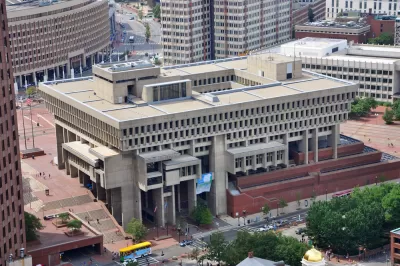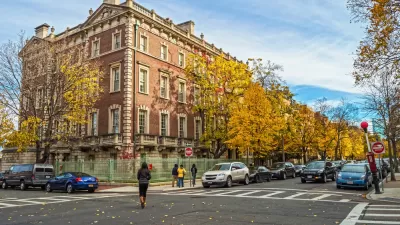Mayor Wu recently overhauled the makeup of Boston’s Zoning Board of Appeals, but bigger changes will be necessary to depoliticize the city’s development approvals process.

The Boston Globe Editorial Board describes the city’s Zoning Board of Appeals (ZBA) as having “something of a stranglehold on small and mid-sized building projects throughout the city.”
So the Editorial Board welcomes a recent shakeup of the ZBA [paywall] by Mayor Michelle Wu, who is a longtime critic of the ZBA [paywall] and the politics of the city’s development approvals process. Wu’s past reform proposals included calling for ZBA appointees to have climate change and urban planning expertise, rather than being required to come from specific interest groups such as the Building Trades Council, the Boston Society of Architects, and the Greater Boston Real Estate Board.
But Wu is still working within those parameters with the recent appointments, so the editorial is only cautiously optimistic that the shakeup might work as the mayor intends. “But it doesn’t solve the larger issues that she was so intent on solving — providing diversity of professional backgrounds and skills without leaving board members open to charges of insider dealing or even intentional insider obstructionism,” according to the editorial.
Barring the state-level approval that would be required to substantively change the ZBA, the Boston Zoning Commission, which has purview over the city’s zoning code, could also improve the city’s approval process.
In the meantime, however, Boston’s ZBA is expected to continue to review hundreds of appeals for small projects “that in every other city and town would be routine building permit matters — a roof deck or garage or an in-law apartment,” reads the editorial.
FULL STORY: Wu cleans house at zoning board [paywall]

Planetizen Federal Action Tracker
A weekly monitor of how Trump’s orders and actions are impacting planners and planning in America.

Congressman Proposes Bill to Rename DC Metro “Trump Train”
The Make Autorail Great Again Act would withhold federal funding to the system until the Washington Metropolitan Area Transit Authority (WMATA), rebrands as the Washington Metropolitan Authority for Greater Access (WMAGA).

DARTSpace Platform Streamlines Dallas TOD Application Process
The Dallas transit agency hopes a shorter permitting timeline will boost transit-oriented development around rail stations.

LA County Creating Action Plan to Tackle Extreme Heat
Los Angeles County is creating a Heat Action Plan to help communities stay safe during extreme heat, with steps like adding more shade, improving buildings, and supporting the neighborhoods most at risk.

Maryland Plans Quick-Build Complete Streets Projects
The state will use low-cost interventions to improve road safety in five Maryland counties.

Downtown Los Angeles Gears Up for Growth
A new report highlights Downtown L.A.’s ongoing revival through major housing projects, adaptive reuse, hospitality growth, and preparations for global events in the years ahead.
Urban Design for Planners 1: Software Tools
This six-course series explores essential urban design concepts using open source software and equips planners with the tools they need to participate fully in the urban design process.
Planning for Universal Design
Learn the tools for implementing Universal Design in planning regulations.
City of Charlotte
Municipality of Princeton
Roanoke Valley-Alleghany Regional Commission
City of Camden Redevelopment Agency
City of Astoria
Transportation Research & Education Center (TREC) at Portland State University
US High Speed Rail Association
City of Camden Redevelopment Agency
Municipality of Princeton (NJ)





























